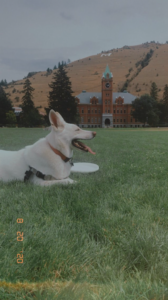The Power of Hours Adding Up by Jamie Miller
Time’s linear pattern as a force always moving forward feels like it may be the last concept we can depend upon as a consistent reality of life. All other contributing theories that keep the earth spinning have cracked and disintegrated thanks to our new friend Covid-19. Our perspective of equality has been challenged, our economic system has been evaluated and the everyday routine of the 9:00-5:00 working american is being rethought. Everything has changed for me. Except the idea of time. Time moves forward. That’s all we got. Time adds up. Time leads us places.
Looking back, there are three significant bench marks in time that have led me up where I am now.
The first— would be March 2020. Zoom was still a new phase of communication and I had to google what the word “furlough” meant. I was in my first adult job since graduating college and was being temporarily laid off due to this plot twist to the new year: the coronavirus. This was an important moment— because I didn’t feel sad, I felt surprisingly relieved. Don’t get me wrong, I was a young modern millennial, with a millennial’s job: a tech-start up associate. However, I spent 45 hours a week at the same desk helping rich people enjoy what money has given them easier. The weighted reality of feeling like I was spending the majority of life towards something meaningless was becoming overpowering. So much so: when they “furloughed” me I felt relieved. The world was on fire, and I wondered what am I going to do about it.
The second— I realized I’m asian. To clarify that: I’ve known that for a while. But growing up in a conservative state my whole life, representing two percent of the population, it was easier to pretend I didn’t know that. But then George Floyd died. Many of my cacausian friends began to ask me how they could see me better as someone who identified as BIPOC. They also asked what to do to change the community into a more equal environment for everyone. Which made me ask myself, what do I do to do the same? What are tangible ways to create a non-prejudice world?
The third— Back in college I was diagnosed with PCS, post-concussive syndrome. I was adjusting to a physical handicap that was affecting my school work. This led me to sitting in my law professor’s office hours: and her saying, “It will take a village. You need support. It’s not cutting corners. It’s leveling the playing field”. That moment changed my life, and I had a dream to help everyone have a seat at the table, regardless of where they came from.
Time moves forward. Every piece of every day rolls into the next. All those days, those three pivotal days rolled into my AmeriCorps service- serving to end the achievement gap of college students who grew up in poverty. Now every day, as an academic coach to our college scholars at the University of Montana, I sit amongst students who are in the middle of days I’ve experienced before. They are coming to terms with the effects cultural hardships and life events have had on their character and perspective. I sit with them and see so many of the same challenges I’ve faced, swirling around in their faces.I have found such joy serving them, encouraging their exploration of what it means to acknowledge they’ve been affected by the world around them, as we all have, and not let it crush their self-worth. I am inspired by what inspires them. These students have grit and are deciding to shape a new future for themselves. Helping them learn how to advocate for themselves and level the playing field to help them graduate has helped me advocate for myself as both a BIPOC person and as someone who got dealt a hard card. The simple task of being an encouraging voice, cheer leader and advocate for their every day struggles feels like I am part of something important- everyone is worth being invested in, regardless of their background.
Working with college students has shown me we are in changing times. We as a society once blamed ourselves if we fell into categories as minorities, disabled, or economically disadvantaged. Now we as a culture are rising up to help one another end the achievement gap and give everyone an equal chance to be worthy of a good life.
Playing a helping hand to the academic advisors’ has inspired me. There is always more empathy we can have to assist someone, always another angle to troubleshoot and assist someone’s disadvantage, and always hope to have that the best way to make a better world is not to point fingers but join the cause.
All the bad things in my life added up to something good. I am confident the same thing will happen for my students when we put ourselves last and put those in need first.
 Blog Posts
Blog Posts 